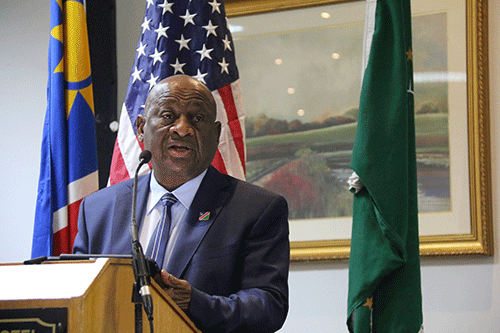Health minister, Dr Kalumbi Shangula said the ministry is committed to attaining Universal Health Coverage (UHC) for Namibia and progress has been made thus far.
Shangula said attaining UHC would mean that the Namibian people would have access to affordable, equitable quality health services without suffering financial hardship.
Speaking at the launch of the National Health Accounts and the National AIDS Spending Assessment yesterday, he further said the response to HIV/AIDS and recently to the Covid-19 pandemic proved that health is everyone’s business and requires a true multi-sectoral approach to keep the nation safe.
He said these aids launched tools that will help track non-health expenditures such as social mitigation, education, labour, justice, and other sectors related to the multi-sectoral HIV and Covid-19 response.
“Through this vision, our priority is to align health financing with stated health and welfare goals, and to ensure that spending is effective, and services reach those who need them, including the most vulnerable, people most at risk and living with HIV/AIDS, mothers, and children,” said Shangula.
The National Health Account is a tool that measures the total health spending in a country in each period while the National AIDS Spending Assessment is a tool to track the flow of resources spent responding to HIV/AIDS.
This exercise aims to generate estimates of the total amount of funds spent on both health in general and HIV/AIDS specifically, tracking the funds from their sources to the final inputs and beneficiaries.
Shangula said the provision of quality health and social care services to all Namibians can only be achieved if there are enough qualified human resources, uninterrupted supplies of medicines and clinical supplies, well-constructed and maintained health facilities, good information systems, sufficient health financing, and good policies, laws, and guidelines.
“The ministry is conducting a resource tracking exercise using a combination of the Health Accounts and the National AIDS Spending Assessment (NASA) methodologies in a single, comprehensive resource tracking exercise covering the three financial years from 2020/21 to 2022/23,” said the parliamentarian.
He added that the National Health Accounts estimation is a critical step towards understanding past spending on health.
“Data from the National Health Accounts will support the government’s efforts to design, monitor, and assess the health financing reforms necessary to achieve the objectives as articulated in the ministry’s Strategic Plan and measure our progress in providing financial protection as defined by the UHC principles,” he said.
One of the biggest contributors to Namibia’s healthcare is the United States President’s Emergency Plan for AIDS Relief (PEPFAR) which vouched to invest approximately N$840 million (US$45 million) by providing health and social services to vulnerable children, adolescents, and youth in the country.
Speaking at the same event, US ambassador Randy Berry said the United States government through PEPFAR and USAID is committed to continue supporting the Namibian government to strengthen its health system so that all Namibians have equitable access to quality health services wherever and whenever they need them.
“The American people’s commitment to work with the Namibian government to end preventable suffering and deaths in Namibia is unyielding and our commitment to strengthening our partnership system remains strong,” stated the diplomat.
– psiririka@nepc.com.na


